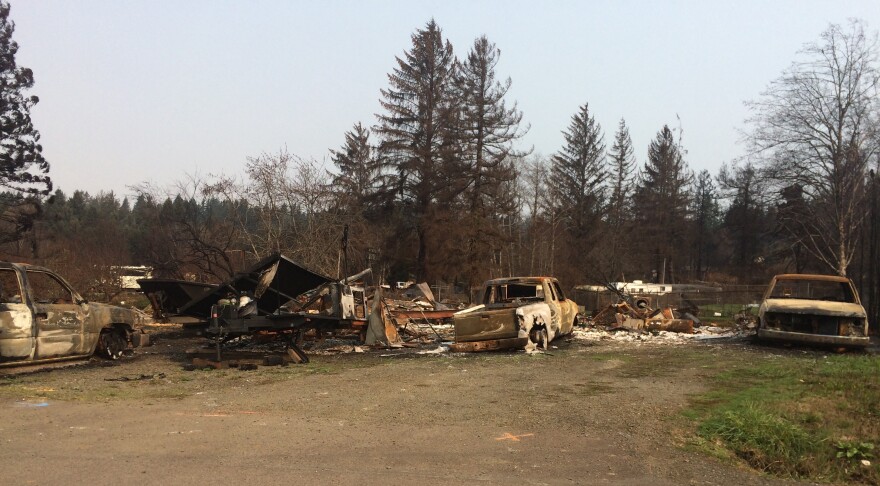No one died when the Echo Mountain Complex Fire swept through parts of Lincoln County last month. But the inferno destroyed hundreds of homes and touched countless lives. Now that the flames are out, locals are trying to figure out what comes next.
For Rep. David Gomberg, D-Otis, the fires were personal.
"You can see the charred property right across the street," he said, during a recent tour of his neighborhood. Gomberg lives on a rural road just north of Lincoln City. “A third of the houses are gone. Completely gone," he said.
Gomberg said he and his wife fled as the sun came up on the day after Labor Day.
“Suzy and I stopped right before we walked out of the door, and I reached into the cabinet. I pulled out a bottle and I poured two glasses," he said. "And we toasted a million memories of the home that we had lived in for 30 years. And then we closed the door and left."

Outside, people were streaming down the road -- the only way out of the wooded, hilly neighborhood.
“The smoke was thick. The sky was red. And people were leaving in a hurry,” he said.
Gomberg said when you live on the coast, you’re always thinking about potential disasters. Just not this kind. “We think about earthquakes and tsunamis," he said. "That’s what we prepare for. And this event caught us by surprise.”
The cause of the Echo Mountain Fire is still unknown, but it was driven by the same hot, east wind that caused so much devastation in other parts of Oregon. While Lincoln County avoided any loss of life or serious injuries, officials say nearly 300 homes were destroyed, including dozens of mobile homes. And it’s in a region that had a housing crunch to begin with.
“There’s no more significant challenge, I think, than the housing situation," said County Counsel Wayne Belmont during a recent meeting of the Lincoln County Board of Commissioners. "It was already a challenge in Lincoln County, especially affordable housing, and it will continue to be.”

It’s a challenge that’s on the radar of FEMA. The federal agency has been working with the Red Cross to find housing for people who lost their homes.
“We try to keep people in their community," said FEMA spokesperson Jann Tracey, during an interview at the FEMA intake center in Lincoln City.
Tracey said many evacuees are staying in hotels or with relatives. The agency is considering other options until homes can be rebuilt. But with rental property already in high demand, all options are on the table, including temporary manufactured housing. Tracey said that’s not as easy of a solution as it might seem.
“It’s not a fast remedy to an immediate problem, because you have to have sewage lines, gas lines, electric lines," she said. "You can’t just move a trailer in, so to speak, and dump it on the property.”
Back in the fire zone, David Gomberg marveled at how much his neighborhood has been transformed.
“This was a fickle fire," he said. "It came up the hill and took homes out, and then, without reason, left others completely standing and untouched.”

After ten days of uncertainty, Gomberg and his wife were allowed to return. Their house was still standing. Gomberg credits firefighters for saving his home and many others in the neighborhood. He said a wave of relief swept over them as they walked in the door.
"But there’s also a wave of guilt that comes in that says, ‘My house is still standing, and so many of my neighbors’ aren’t’" he said.
"I mean, we came into the house. The two glasses were still sitting on the table. We had another toast to our good fortune, and then immediately went up the hill to see what we could do to help our neighbors that weren’t nearly as fortunate,” said Gomberg.
The flames came within 100 feet of the Gombergs' house, and burned up trees and vegetation on about half their property. But he said his family’s experience pales compared to the people in his community who lost everything.






